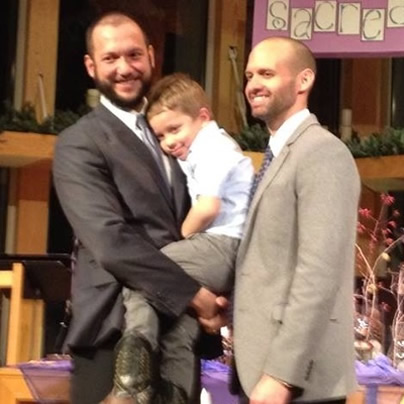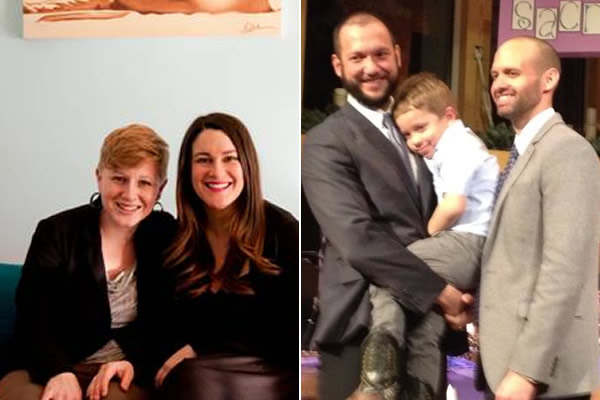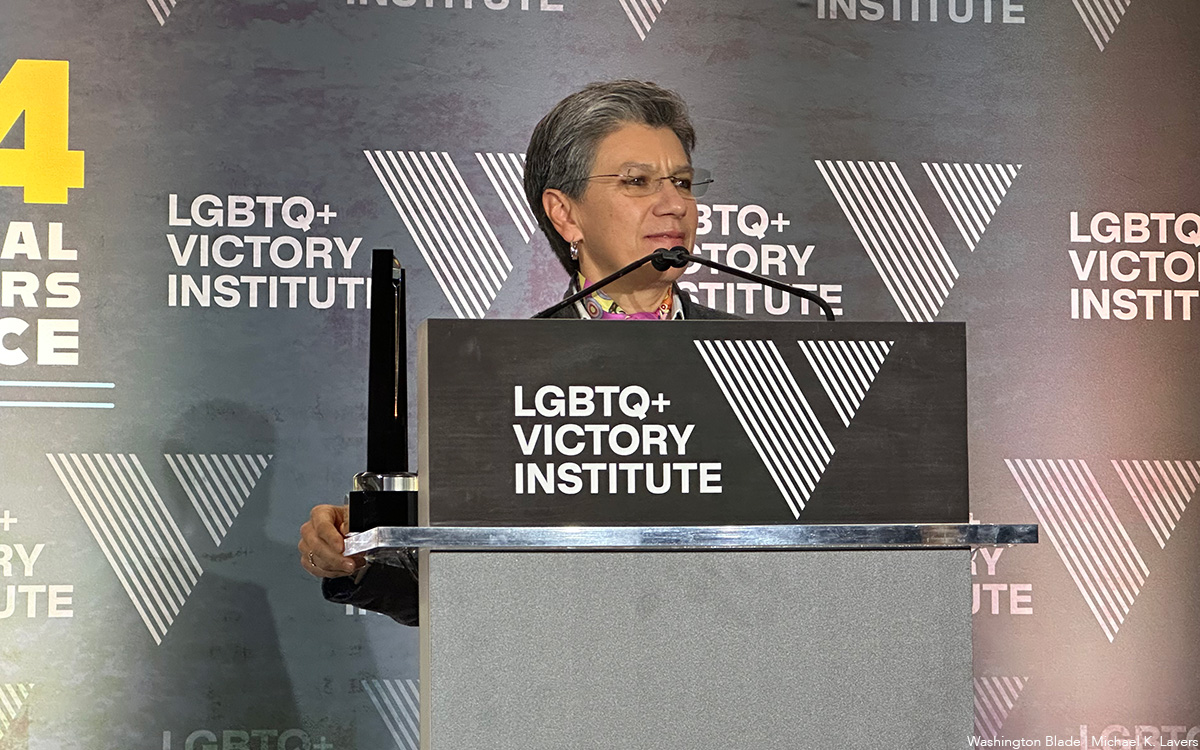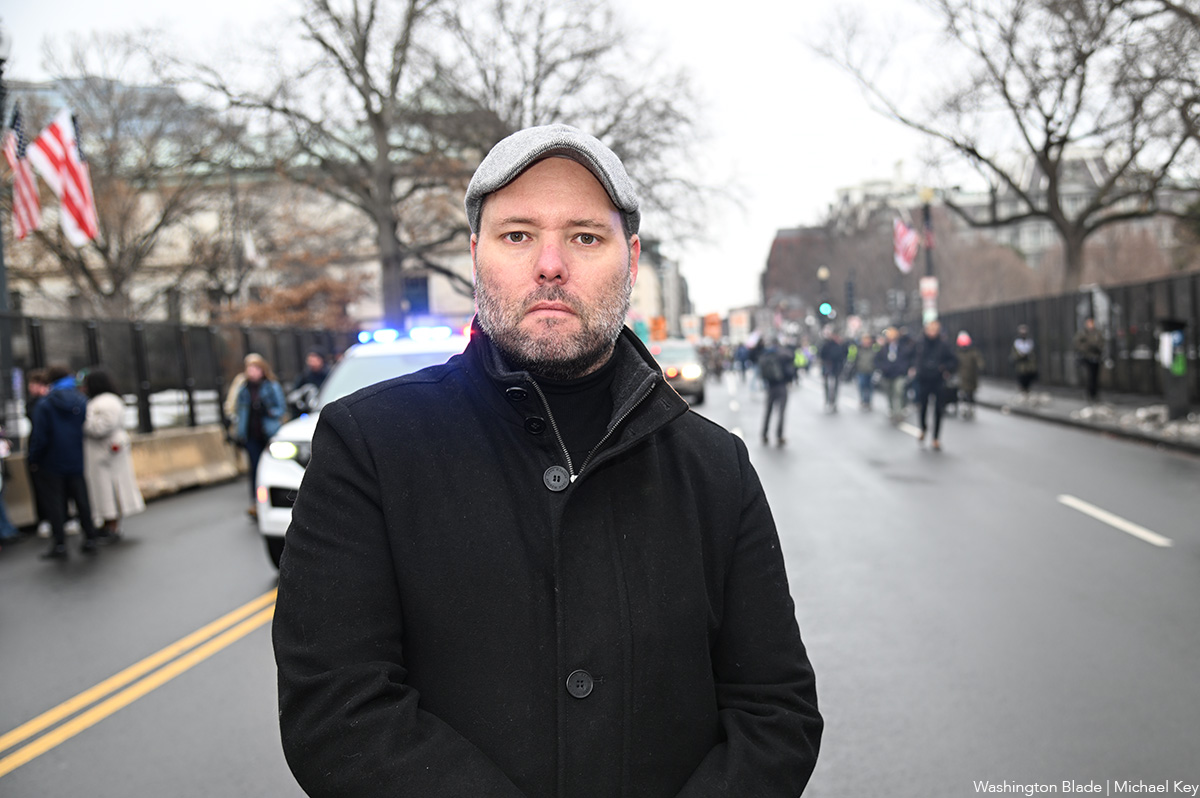News
Gay couples sue Utah to recognize their marriages
ACLU files lawsuit on behalf of four couples who wed


Elenor Heyborne (on left) and Marina Gomberg; Matt Barazza, Tony Milner (left) and Jesse (center) are suing Utah to recognize their marriages. (Photos courtesy of the American Civil Liberties Union)
For Matt Barazza, government recognition of his marriage in Utah is important not only to him and his spouse, Tony Milner, but also to the four-year-old child whom they’ve raised since his birth.
After marrying in their home state of Utah on Dec. 20 — the first day same-sex marriage came to Utah — the couple submitted paperwork for a second-parent adoption of the child, Jesse, and received a hearing date of Jan. 10. But plans changed after Gov. Gary Herbert announced the state wouldn’t recognize Utah same-sex marriages in the wake of a stay on the weddings from the U.S. Supreme Court.
As a consequence, the judge presiding over the request for second-parent adoption pushed back the hearing to Jan. 31, and Barazza and Milner elected to join a proposed lawsuit by the American Civil Liberties Union to ensure Utah would recognize the more than 1,300 gay weddings performed in the state.
“That’s the primary reason for us filing the lawsuit at this point was to have the Utah courts make a decision and recognize that our marriage is legal, so that we can go forward with the second-parent adoption and try and get the protections that we can for our son,” Barazza told the Washington Blade on Monday.
While Barazza, 38, an attorney, and Milner, 33, a director of a non-profit that serves homeless families, are both raising Jesse in Salt Lake City, only Barazza is recognized as the adoptive parent because under Utah law, only one of the two was able to adopt the child. The couple also legally married in D.C. in 2010, but elected to do so again when same-sex marriage came to Utah so they could wed in their home state.
But with their marriage no longer recognized by Utah, Barazza said he lives in constant fear of what might happen because of the lack of legal recognition between his partner and their son.
“You fear the worst case scenario always,” Barazza said. “As the one who’s the legal parent, if anything were to happen to me, it would leave [Jesse] basically an orphan as far as the law is concerned…All that would be in spite of my husband Tony being there from Day One and being just as much a parent as I am.”
On Dec. 20, U.S. District Judge Robert Shelby ruled that Amendment 3, Utah’s ban on same-sex marriage, was unconstitutional as a result of a federal lawsuit seeking marriage equality, allowing gay couples to wed in the state immediately. But upon the request from the state, the U.S. Supreme Court placed a stay on the weddings on Jan. 9 pending appeal of the lawsuit. The next day, Herbert said the state wouldn’t recognize the same-sex marriages of couples that married in Utah before the stay was in place.
Although U.S. Attorney General Eric Holder would later announce the marriages would be recognized for federal purposes, as it stands now the couples will have to wait for the outcome of the federal lawsuit — which could take years — to find out whether the state will recognize their marriage.
Barazza and Milner are one of four couples seeking recognition of their marriage from Utah after having wed in the 18 days when same-sex marriages were legal there. The lawsuit was filed Tuesday in state court by the American Civil Liberties Union, the ACLU of Utah and the Salt Lake City-based firm Strindberg & Scholnick, LLC.
The 32-page complaint alleges Herbert’s decision not to recognize the marriages violates both the due process clause under Utah’s constitution and the Fourteenth Amendment to the U.S. Constitution. Additionally, it seeks relief under declaratory judgment and Rule 65B, which allows individuals in Utah to seek extraordinary relief against wrongful use of public authority.
“By placing recognition of their marriages ‘on hold,’ the State of Utah has placed the legal status of plaintiffs’ families, including their children, in legal limbo and created uncertainty as to their rights and status in virtually all areas of their lives,” the complaint states.
Joshua Block, a staff attorney with the ACLU’s LGBT project, said the goal of the lawsuit is to achieve a result similar to what the California Supreme Court decided after state voters in 2008 approved Proposition 8.
“What happened in Prop 8 is they said if you got married before the amendment went into effect, the marriages are valid and continue to be recognized in California, but no new marriages could happen,” Block said.
In addition to Barazza and Milner, the other plaintiff couples in the lawsuit are Marine Gomberg and Elenor Heyborne of Salt Lake City; JoNell Evans and Stacia Ireland of West Valley, Utah; and Donald Johnson and Fritz Schultz of Sandy, Utah.
After being together for nine years, Gomberg, 29, told the Blade she and Heyborne, 28, wanted to wed immediately on Dec. 20 upon learning that a court has instituted marriage equality in Utah. The couple held a commitment ceremony in 2009, but weren’t legally married until last month.
“There was a huge sense of immediacy because this was something we waited so long for, and we didn’t know how long the window would be,” Gomberg said.
Soon after, Heyborne, a state employee who works in communications, learned that Utah would no longer recognize their union and she sent a text message to Gomberg, who also works in communications, to inform her of the news.
“Obviously, this put all our hopes and dreams to have a kid on hold because the state of Utah doesn’t recognize same-sex adoption, so we would have to go out of state, establish residency somewhere, and then come back here,” Heyborne said. “When we got married, we kind of thought that that was a hoop we would not have to jump through now that we were legally married.”
Marty Carpenter, a Herbert spokesperson, said the governor is standing by his decision not to recognize the same-sex marriages performed in Utah.
“Gov. Herbert has said throughout this process that his responsibility is to follow the law,” Carpenter said. “That is exactly what the administration is doing and we respect the rights of those who disagree to take their grievances before a judge.”
Although state officials announced they’re not recognizing the marriage, the Utah Tax Commission issued guidance last week saying that same-sex couples married in 2013 can be recognized as such for tax purposes for that year if they filed federal returns as married.
Block said the new lawsuit is completely independent of the existing marriage equality lawsuit, known as Kitchen v. Herbert, which brought the same-sex marriages to the state and is pending before the U.S. Tenth Circuit Court of Appeals.
In the event that court or the U.S. Supreme Court rules that state bans on same-sex marriages like Amendment 3 are constitutional, Block said the outcome wouldn’t affect gay couples married in Utah if the new lawsuit succeeds because “they had vested rights that can’t be taken away just like if Prop 8 had been upheld as constitutional.”
“But then, even if Kitchen is affirmed on appeal,” Block added, “and the marriage amendments need to stop being enforced again, that doesn’t really solve the problem of legal implications of what happens over the course of people’s lives of the course of this year and next year until the Kitchen litigation comes to an end.”
Block was unable to predict the length of time it would take for the new lawsuit to be resolved, but noted the case was filed before state district court and said he expected requests soon for summary judgment before the Utah Supreme Court.
Each of the plaintiff couples that spoke to the Blade was optimistic about the lawsuit moving forward. Barazza said he’s “really confident” the lawsuit will succeed based on growing public support for marriage equality.
“Public opinion is going in that direction, and I think the courts are recognizing that,” Barazza said. “Also, just with the fundamental fairness and equality as being recognized under the Constitution, I think that is where the country’s headed.”
Block was also optimistic because he said Utah has “a long history” of protecting vested rights under its constitution, such as when the court rebuffed the state legislature’s attempt to change a person’s right to sue under tort law.
“That’s very similar to your legal obligations and rights that come with a marriage license and recognition,” Block said. “Once you got married, you accrued vested rights and all the legal implications of that marriage. And under those principles, I think this right is more important than all the other vested rights that have been protected.”
Colombia
Claudia López criticizes Trump over threats against Colombian president
Presidential candidate would become country’s first lesbian head of government

BOGOTÁ, Colombia — Colombian presidential candidate Claudia López has criticized President Donald Trump after he suggested the U.S. will target Colombian President Gustavo Petro.
“Colombia is very sick, too, run by a sick man, who likes making cocaine and selling it to the United States, and he’s not going to be doing it very long,” Trump told reporters on Air Force One on Sunday.
Trump made the comments a day after American forces carried out an overnight operation and seized now former Venezuelan President Nicolás Maduro and wife, Cilia Flores, at their home in Caracas, the Venezuelan capital.
Maduro and Flores on Monday pleaded not guilty to federal drug charges in New York.
Petro is a former Bogotá mayor and senator who was once a member of the M-19 guerrilla movement that disbanded in the 1990s. He has urged Colombians to take to the streets and “defend national sovereignty.”
“Colombians are the ones who decide who governs Colombia,” said López on her X account. “President Gustavo Petro won free elections and has a constitutional mandate.”
López did not mention Trump by name in her comment.
The first-round of Colombia’s presidential election will take place on May 31. The country’s 1991 constitution prevents Petro from seeking re-election.
López in 2019 became the first woman and first lesbian elected mayor of Bogotá, the Colombian capital and the country’s largest city. She took office on Jan. 1, 2020, less than a month after she married her wife, Colombian Sen. Angélica Lozano.
“This year we will decide at the polls what direction (the country) is heading and what leadership will advance Colombia,” said López in her X post. “Supporting soft dictatorships and attacking democracies is an absurd and unacceptable political action by the United States towards Colombia, Venezuela, and Latin America.”
Quién gobierna en Colombia lo decidimos los colombianos.
El presidente @petrogustavo ganó unas elecciones libres y tiene un mandato constitucional. Este año decidiremos en las urnas qué rumbo y a cargo de qué liderazgo avanza Colombia.
Sostener dictablandas y atacar democracias… https://t.co/K61G2QUcck— Claudia López Hernández (@ClaudiaLopez) January 5, 2026
López would be Colombia’s first female president if she wins the election. López would also become the third openly lesbian woman elected head of government — Jóhanna Sigurðardóttir was Iceland’s prime minister from 2009-2013 and Ana Brnabić was Serbia’s prime minister from 2017-2024.
The LGBTQ+ Victory Institute in 2024 honored López at its annual International LGBTQ Leaders Conference in D.C. The Washington Blade interviewed her during the gathering.
Minnesota
Tim Walz drops out of Minn. governor’s race
The longtime LGBTQ ally and Democratic party figure blames ongoing fraud investigations supported by Trump and the GOP for his withdrawal.

Minnesota Gov. Tim Walz announced Monday that he is withdrawing from the 2026 Minnesota governor’s race, citing what he described as political interference and attacks from Republican Party leaders.
Walz made the announcement on social media, where the post quickly gained traction, drawing more than 30,000 likes on Instagram and 23,000 reactions on Facebook.
In his statement, the incumbent governor directly blamed President Donald Trump and his allies, both in Washington and in Minnesota, for fueling what he characterized as politically motivated accusations of widespread fraud tied to federal nutrition programs in the state.
According to a 2024 ABC News story, more than 70 people have been charged as part of a “wide-ranging criminal conspiracy” that allegedly exploited two federally funded nutrition programs during the COVID-19 pandemic, resulting in more than $250 million in fraudulent claims.
“I won’t mince words here,” Walz wrote. “Donald Trump and his allies — in Washington, in St. Paul, and online — want to make our state a colder, meaner place. They want to poison our people against each other by attacking our neighbors. And, ultimately, they want to take away much of what makes Minnesota the best place in America to raise a family.”
In his announcement, Walz also cited recent reports from Somali American child care center operators in Minnesota who said they have faced violent threats and vandalism after right-wing YouTuber Nick Shirley posted a video alleging fraud at their facilities. Following the video’s release, the Trump-Vance administration cut federal child care funding nationwide.
Walz also criticized the federal government’s decision to withhold child care funding from states amid the allegations.
“They’ve already begun by taking our tax dollars that were meant to help families afford child care,” he added. “And they have no intention of stopping there.”
Last week, a Department of Health and Human Services official confirmed that the Trump administration is pausing child care funding to all states following the Minnesota allegations, stating that funds will be released “only when states prove they are being spent legitimately.”
“Republicans are playing politics with the future of our state,” Walz said. “And it’s shameful.”
Walz previously served as the Democratic vice presidential nominee alongside then–Vice President Kamala Harris during her unsuccessful 2024 presidential campaign.
Meanwhile, longtime Trump ally and MyPillow CEO Mike Lindell announced in December that he is running for Minnesota governor and has already received Trump’s endorsement.
Walz has been a longtime ally of the LGBTQ community, dating back to 1999, when he served as a football coach and teacher at Mankato West High School in Mankato, Minnesota, about 80 miles southwest of Minneapolis.
It is also possible that U. S. Sen. Amy Klobuchar (D-Minn.) is considering entering the race to succeed him.
Colombia
Blade travels to Colombia after U.S. forces seize Maduro in Venezuela
Former Venezuelan president, wife seized on Saturday

Washington Blade International News Editor Michael K. Lavers will be on assignment in Colombia through Jan. 10.
Lavers arrived in Bogotá, the Colombian capital, on Monday. American forces two days earlier carried out an overnight operation and seized now former Venezuelan President Nicolás Maduro and wife, Cilia Flores, at their home in Caracas, the Venezuelan capital.
Maduro and Flores on Monday pled not guilty to federal drug charges in New York.
Maduro in 2013 became Venezuela’s president after his predecessor, Hugo Chávez, died.
The country’s ongoing economic and political crises have prompted millions of Venezuelans to flee to neighboring Colombia and other countries throughout Latin America and around the world. The seizure of Maduro and Flores threatens to further destabilize Venezuela and the broader region.
The Washington Blade, which has reported from Colombia several times over the last decade, has interviewed several LGBTQ Venezuelan opposition leaders. The Blade has also extensively covered the plight of LGBTQ Venezuelans and Venezuelans with HIV/AIDS who have left their country because of violence, persecution, discrimination, and a lack of medications.
“LGBTQ Venezuelans in Colombia and elsewhere have a unique perspective on the events that have transpired in their homeland over the last two days, and how they continue to reverberate throughout the hemisphere,” said Lavers. “It is critically important for the Washington Blade to document the situation in the region as it continues to evolve and to show how it will impact LGBTQ communities.”
“The Blade has a long history of covering the plight of LGBTQ communities around the world and this trip reflects our commitment to the region,” said Blade Editor Kevin Naff. “This reporting will help shine a light on the challenges facing LGBTQ Venezuelans and those living with HIV and how they are coping with the unfolding events.”
Lavers last reported from Colombia in 2021. His coverage included a trip to Cúcuta, a Colombian city that is on the country’s border with Venezuela.



















